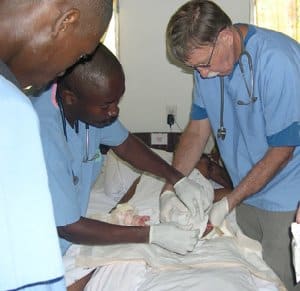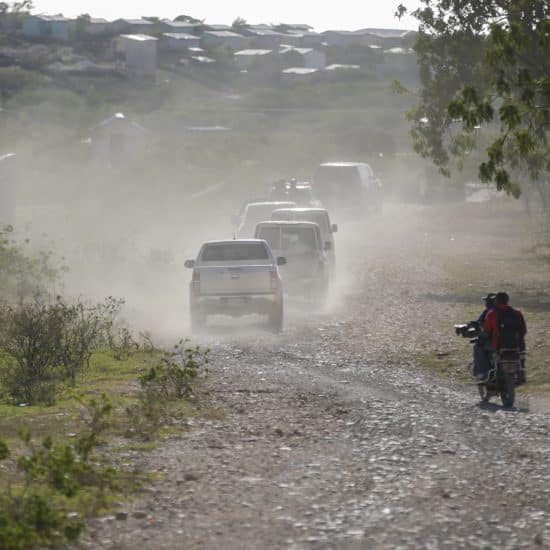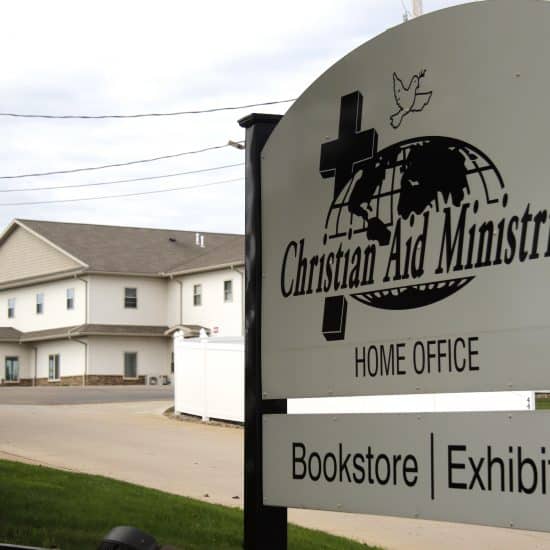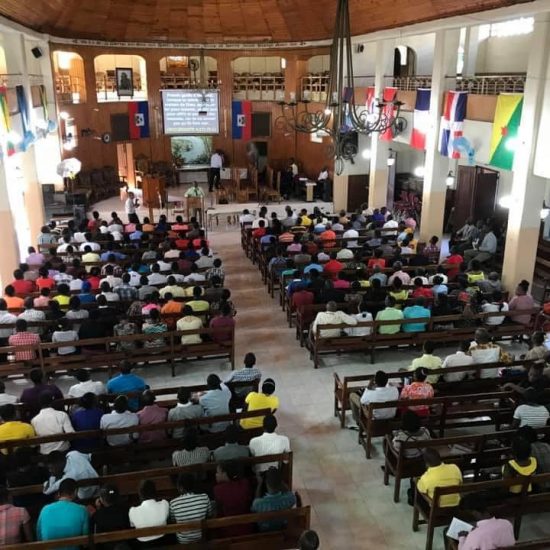MOUNTAIN VIEW — As Dr. Jon Roberts sat down next to Bernanvil Evan to begin the painful process of removing dead tissue from Evan's crushed leg, the 25-year-old Haitian touched the physician's arm. "Thank you for coming to Haiti," he said through an interpreter.
Dr. Roberts, a member of First Baptist Church, Mountain View, was among an early wave of medical personnel to respond to intense physical suffering in the wake of the earthquake that rocked the Caribbean nation on Jan. 12, 2010. The physician closed the year in ministry to victims of cholera that broke out in late October.

Dr. Jon Roberts of Mountain View, right, and two Haitian physicians minister to an earthquake victim in Haiti. Dr. Roberts has volunteered in Haiti for seven years and was among the early wave of medical volunteers to assist after an earthquake struck in January 2010. (Photo courtesy of Dr. Jon Roberts)
|
In daily journal entries, the physician described what he saw and felt as he ministered alongside other volunteers and Haitian physicians and nurses in the quake's aftermath Jan. 20-27 last year at the hospital in Les Cayes, and with cholera patients Dec. 4-12 at a hospital in Cite Soleil, both near Port-au-Prince, the nation's capital.
"It didn't take long to see the magnitude of the devastation," Roberts wrote on Jan. 20, 2010. "Patients were broken physically and emotionally…. When they arrive at the hospital, they have nothing but the clothes on their back…. Almost all patients tell of being buried, some for 15-30 minutes and some for as long as three days before being rescued."
The length of time many were buried or had to wait for medical attention resulted in a large number of amputations in the first few weeks following the disaster. One orthopedic surgeon told Dr. Roberts that at 60 years old, he had had to do more amputations in Haiti than he had done in his entire medical career.
"Haiti is very quickly becoming a country of amputees," Dr. Roberts wrote in his journal.
In addition, Haitians had to handle extreme pain with little medication. Only Tylenol and Motrin were available for postoperative pain, the Missouri doctor said. Volunteers had brought a more potent medication, but their small supply had to be limited to the most severe cases.
Other supplies were at a minimum before the quake hit. "The blue pads that are placed under patients and under limbs for a dressing change are now being cut into fourths to try and make them go further…. This again reminds me how much the little hospital in Les Cayes does with so little," he wrote.
In Evan's case, stronger antibiotics and specialized therapies and care might have made a difference. "It is all I can do to hold back tears when I contemplate what his life will hold," Dr. Roberts wrote.
The December trip to Cite Soleil again emphasized the physical and financial need. Dr. Roberts told the story of a 6-month-old little girl in respiratory distress who needed to be taken to the University of Miami hospital in Port-au-Prince.
"There is no oxygen available and we are not allowed to leave the compound, so an ambulance is called – which is an old pickup truck. The mother hold the child in the back of the pickup," Dr. Roberts wrote. "There is a red light on top of the cab of the pickup and the passenger in the cabs hold a siren outside the window of the cab."
Patients were placed on cots or on vinyl-covered boards with a hole cut in the middle of each. A bucket was placed under each hole for diarrhea and a bucket sat near each patient's head for vomit. Medical personnel and family members dumped the contents every hour.
In addition, medical staff faced the possibility of increasing violence triggered by the outcome of countrywide elections that week. Cite Soleil, with an estimated 200,000 to 400,000 population, is known for gang rule and is considered a slum of the capital city.
Samaritan's Purse, Franklin Graham's humanitarian aid ministry, has been working in the area since the quake, distributing food and water, building living quarters and providing a medical clinic. The organization constructed the 240-bed hospital in 10 days in November.
Different gangs rule over each section of Cite Soleil. Because Samaritan's Purse has developed a good working relationship with the gangs, the hospital was protected during violence that began on Dec. 7. Although the hospital was not targeted, travel to and from the facility was restricted. Food supplies also ran short.
"Today we ran out of crackers for the children. There is no formula for the babies, only the rehydration solution. We are even out of bananas," Dr. Roberts wrote on Dec. 10. "The children cry because they are hungry."
Because cholera bacteria is spread through food and water, the hospital had to turn down food contributions from the community. Medical personnel removed all the crackers from their emergency ration packs so the children would have something.
The 2010 trips marked the seventh year Dr. Roberts has worked in Haiti. A physician with Sisters of Mercy in Springfield, he made his first trip with Samaritan's Purse. Then he connected with Ron and Debbie Wray, Canadian Mennonites with Harvest International. He has worked primarily in the Les Cayes area for six years, usually alongside Dr. Bill Tenhaaf of Grand Rapids, Mich., who gives a week each month to train three Haitian doctors for surgery.
What happened to Bernanvil Evan? Dr. Roberts was able to take the young man a prosthetic in December. The physician also learned Evan has been accepted into a program to be trained to make prosthetics.
The Missouri physician admitted the Haitian quake and its aftermath brought his own faith into perspective. "I question why a country that has so little would be struck by such an enormous disaster…," he wrote.
But he grabbed hold of Hebrews 11:1 and words from Billy Graham. "I realize I have been given a gift to be a physician and the privilege of coming to Haiti."






